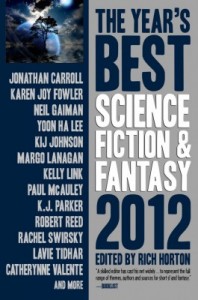 An Interview by Gina Guadagnino
An Interview by Gina Guadagnino
“Widows in the World” by Gavin Grant will be appearing in Prime’s forthcoming Year’s Best Science Fiction and Fantasy: 2012 edited by Rich Horton. Pre-order here!
We’ve all had moments where walking away from the past, however painful, seems like the best decision. The Granny’s decision to abandon her family was building long before she finally walked out of the house. What, of all the many elements pushing her out the door, do you feel was the most vital to her choice?
The tipping point that pushed her out, was her fear of what she might do to the baby’s life and her future.
You describe the Granny and her house as being friends, but the people in the house feel like a constant source of stress and pressure for her. The Granny connects more with the sentient house itself, rather than those in it. Can you describe that relationship more for us?
It’s sometimes easier to deal with other things instead of people and having the house be sentient adds a new layer to the Granny’s people avoidance behaviors. She has bent the house—and herself—out of shape and made it a part of her new narrative, something she couldn’t coerce a person into doing. So it’s not a healthy relationship.
One of the most striking things about this story was your decision not to name most of the characters; it is only much later in the story that we learn the Granny’s name. Even the Baby wishes to delay being named, and wants to be referred to as “the baby” for as long as possible. What are you trying to accomplish through your use of titles to reference most of the characters?
Beyond their simple placement and functioning in the family, I wanted the reader to be inside a character they could describe themselves: most people have or know a grandmother, so naming her thus was a way for her to be everywoman.